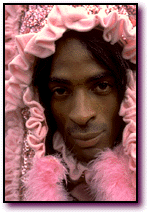 Another response to a Stereotype of the Month Entry: Mardi Gras Indians:
Another response to a Stereotype of the Month Entry: Mardi Gras Indians: Another response to a Stereotype of the Month Entry: Mardi Gras Indians:
Another response to a Stereotype of the Month Entry: Mardi Gras Indians:
>> I checked out your website and concerning the Black Indians, I must say that your contributer is false. <<
Is she? I doubt it, but I'll ask her about it.
>> I even went to the Link the contributer provided and I saw what I already knew <<
Great. Then you must've seen why I included them in my contest.
>> that the Black Indians are of a much older tradition. Their society is distinct and real, it is not a stereotype. <<
I didn't say their culture was a stereotype. I said, or implied, that their dances and costumes stereotype Indian cultures.
>> Once again you deny the validity because it IS black. <<
Wrong.
>> The problem is that the society is already so old and established that it needs not be implied as a "wannabee" those Black people are ALSO indians <<
Thanks, but I'm well aware that many black people trace their roots to Indians. Nevertheless, the Mardi Gras Indians website makes clear that the revelers are honoring Indians by imitating them, not claiming Indians are their ancestors.
>> Their expression in Mardi Gras is not an insult of Native Americans <<
I didn't say it was. A stereotype isn't necessarily an insult. It's often a superficial way of defining someone or something. It may not be insulting or even untrue, but it's misleading because it's one-dimensional.
>> ... they are a part of the Native American tradition! <<
A few of the dancers may be. The majority are imitating people whom they claim a spiritual connection with, not practicing traditions handed down from actual Indian ancestors.
>> Also note, the Haitians are not the originators of the tradition either, nor is Voodoo a pincushionwithcurses religion. <<
Thanks again, but I know that too. As does the contributor, I presume, since she lives in New Orleans and has seen the black "Indians" in person.
>> I mean come on, go to the website link that the contributor gave you and verify the information there. <<
I suggest you go to the website and reread what's there. Reread passages like this, for instance:
It is a West African tradition to signal respect for one's host by dressing like them at ritual celebrations. There is strong evidence that the costumes of modern day Mardi Gras Indians are a cross between Africa ritual costumes and that of the Native American.
As this passage indicates, the black Indians are emulating Indians whom they don't claim ancestry with. They're calling themselves Indians, yet they're costumes aren't pure Indian. If they called themselves the West African/Indian hybrid dancers, I might not mention them. That's not what they're calling themselves.
>> Some of those Black Indians ARE Choctaw chiefs! <<
And many aren't. Those that aren't are stereotyping Indians they aren't related to. Did traditional Choctaw Indians perform these extravagant dances in these extravagant costumes? If not, the dances and costumes are reinforcing a common Indian stereotype.
It's similar to Atlanta Braves fans or Indian Guides who also dress up and play Indian to "honor" Native people. These people also have traditions and a (sub)culture that go back decades. Some undoubtedly have Indian blood. So what's the difference, if any?
Rob
|
. . . |

|
All material © copyright its original owners, except where noted.
Original text and pictures © copyright 2007 by Robert Schmidt.
Copyrighted material is posted under the Fair Use provision of the Copyright Act,
which allows copying for nonprofit educational uses including criticism and commentary.
Comments sent to the publisher become the property of Blue Corn Comics
and may be used in other postings without permission.